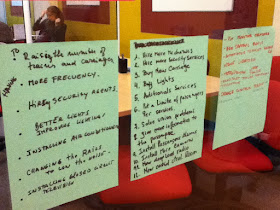© Oxford University Press 2005 All rights reserved.
'Indeed, Turkey's threats to give naval escorts to future Gaza aid convoys, if acted upon, risk a high-seize confrontation between Turkey and its erstwhile, Israeli ally.'
Academic English Facilitator. M.Ed (ACU on-line, ongoing). B.Ling.Sc (Macquarie Uni.). Dip. Lang. Spanish (University of Sydney). TESOL+CELTA (International House Sydney.) Film & TV cert. III (Sydney TAFE). Spanish speaking (University of Buenos Aires + 5 years' immersion). Pathways to either Secondary Teaching Spanish (1) & English subject (2) OR other opportunity amid the journey.
Lessons held through Wall Street English, which means materials are copyright protected.
3 Sept 2011 – 28 Feb 2012


 As we were running out of time there was a brief final discussion. Considering the large size of the class, I think we did quite well.
As we were running out of time there was a brief final discussion. Considering the large size of the class, I think we did quite well. | |
| Fruits of students' efforts in our second Book Club class. |
'[with this approach] The student is an active agent not a passive recipient.'
'The activities should offer ample opportunities for the students to contribute and share
their own experiences, perceptions, and opinions.'
'The text should be allowed to suggest the type of activity. This means breaking away from
the stereotypical format of text and questions.'
'Texts can be presented in a variety of ways. This may sometimes mean withholding the
text until the end of an activity, cutting it up, using fragments of it only, and so on.'
'[this approach] might be seen as failing to teach real literature and taking literature 'seriously', by which is generally meant a body of texts recognised as great literature [...] There is nothing sacred about a literary text. All such texts were at some time written down, rearranged, scratched out, torn up revised, misprinted, and so on. Anyone doubting this should simply look at any well-known writer's notebook or manuscript.'
Any practice is good practice, and it was still a good skills lesson.'More importantly perhaps, if students are encouraged to adopt a 'hands on' approach to texts, they are likely to lose some of the awesome respect which the literary printed word inspires, and which gets in the way of the individual reader/interpreter's personal response to the text.'
 |
| 'FriendPage', an imaginary online social network |
Despite a small turn-out this class went well. The service manager at the institute provided me a lesson plan for it which was sourced from the British Council's website. As the plan describes, in this lesson students are given 'a chance to create an imaginary on-line "wall" where they can react with each other.'
After a general discussion about Facebook, Twitter, social networking sites, learners read a text to answer one question which encouraged reading for gist. Then afterwards, reading for information. Learners thence were introduced to 'FriendPage' written on the board. I elicited typical profile information under the heading on the board. Prompts included 'interested in?', 'personality?', 'right now I feel?': a few of the prompts the students were then given to construct their own profile with. Learners worked alone. Although the plan prescribed a 'snappy' feel or pace for the lesson, this one had more of a relaxed pace a) because of the size of the group (and the absence of a sense of it being a lesson) b) the late hour of the class c) the mixed aspect of student levels. Nevertheless, the group seemed interested in what they were doing. I demonstrated the next activity and learners followed, writing a question of their choosing on each wall of the neighbouring participant (on a piece of paper with lines marked 'fold here'), before passing the papers clockwise, reading and responding to the comment by writing a response, folding the paper over, and so on.
At the end, the class unfolded their 'walls' and read the interesting conversations that had transpired there.
 |
| Students' 'walls', and postings thereon. |
 |
| Students study poems 'Goldfish' and 'The Mosquito' (Alan Jackson/D. H. Lawrence). |
De rabia puso rompiendo la olla, 'In anger (he/she) smashed the pot.' (Lit. from anger put breaking the pot). Or, Botaremos matándote 'we will kill you.'
She never asks me to look after her children. (NOT . . . look her children after.)
We were heading towards Sydney. (NOT *. . . heading Sydney towards.)
We got up early. The plane took off.Type 3 compound verbs need an object which can go between or after* the verb and particle i.e. they are intransitive and separable
Can you put my parents up if they come?
Don't bring these problems up at the meeting.*however, if the object is a pronoun we have to put it between the verb and the particle e.g. put them up; bring them up. (NOT put up them; bring up them.)
You should look up to your parents. (NOT . . . look up parents to.)
He looked up the meaning in the dictionary: look up is a compound verb.
He looked up and saw her smiling at him: up is an adverb saying where he looked.
 |
| students' work for the 'job skills/qualities' activity |